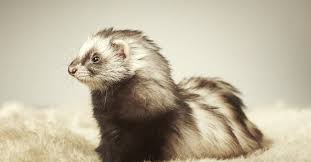
Angora Ferret
Conditions of detention
Angora ferrets require similar living conditions to other ferrets but with extra consideration for their long fur. A multi-level cage with ample space, tunnels, hammocks, and enclosed areas for sleeping is ideal. Because their long fur can trap debris and become matted, it’s essential to keep their living environment clean.
Useful Fact: Angora ferrets may benefit from bedding made from materials that do not cling to their fur, reducing the risk of matting and keeping their coat in good condition.
Nutrition and diet
Like all ferrets, Angora ferrets are obligate carnivores and require a diet high in animal protein and fat. They should be fed high-quality ferret food that meets their nutritional needs. Fresh water should always be available, and treats should be given sparingly.
Useful Fact: Angora ferrets, due to their longer fur, may require slightly more grooming-related supplements (like omega fatty acids) in their diet to maintain coat health and shine.
Health
Angora ferrets generally have similar health needs to other ferrets, but their long fur can sometimes lead to specific issues, such as hairballs or skin infections if not properly groomed. Regular veterinary care, including vaccinations and parasite prevention, is essential.
Useful Fact: Due to their long fur, Angora ferrets may need more frequent grooming to prevent matting and to monitor for any skin issues hidden beneath their thick coat.
Grooming and care
Angora ferrets require more intensive grooming than shorthaired ferrets. Regular brushing is necessary to prevent matting and to remove loose fur, which can reduce the risk of hairballs. Occasional bathing with ferret-safe shampoo may be needed, but it should be done sparingly to avoid drying out their skin.
Useful Fact: Using a slicker brush or a comb designed for long-haired animals can help keep an Angora ferret’s coat free of tangles and mats.
Education and training
Angora ferrets are intelligent and can be trained similarly to other ferrets. They can learn to use a litter box, respond to their name, and even perform simple tricks. Positive reinforcement, such as treats and praise, works best in training them.
Useful Fact: Consistency is key in training Angora ferrets, as their playful and curious nature can sometimes make them easily distracted.
Toys and entertainment
Angora ferrets are playful and require a variety of toys to keep them entertained. Tunnels, interactive toys, and anything that stimulates their natural curiosity are ideal. Regular playtime outside of their cage is essential for their mental and physical well-being.
Useful Fact: Due to their longer fur, it’s important to ensure that toys do not have small parts or materials that can become tangled in their coat.
Safety
Angora ferrets, like all ferrets, are small and agile, which means they can easily slip into small spaces or get into trouble if not supervised. Their environment should be ferret-proofed to prevent access to dangerous areas or objects. They should always be supervised when outside of their cage.
Useful Fact: Angora ferrets’ long fur can sometimes obscure their vision, especially when playing, so it’s important to monitor them closely during playtime to prevent accidents.
Accessories
Angora ferrets require standard ferret accessories, including a secure cage, litter box, bedding, and a variety of toys. A harness and leash are also recommended for safe outdoor exploration. Food and water dishes should be heavy enough that they cannot be tipped over easily.
Useful Fact: Given their long fur, it’s important to provide bedding that doesn’t easily cling to or mat their coat, such as fleece or smooth fabrics.
Socialization
Angora ferrets are social animals and thrive on interaction with both humans and other ferrets. They enjoy being part of a group and can form strong bonds with their owners. Regular socialization is important for their emotional well-being, and keeping them in pairs or small groups is often beneficial.
Useful Fact: Angora ferrets, like other ferrets, communicate through body language and vocalizations, so spending time observing and interacting with them can help strengthen your bond.
Travel and Transportation
Angora ferrets can travel well if they are accustomed to it, but they require a secure, well-ventilated carrier. The carrier should be lined with soft bedding that doesn’t cling to their fur, and food and water should be provided for longer trips. It’s important to keep them cool and out of direct sunlight during travel.
Useful Fact: To prevent stress during travel, Angora ferrets should be gradually introduced to their carrier and taken on short trips before embarking on longer journeys.
Behavior and psychology
Angora ferrets are curious, playful, and intelligent, much like other ferrets. They enjoy exploring their environment and are known for their mischievous behavior. They can also be affectionate and enjoy cuddling with their owners, though they may be independent at times.
Useful Fact: Angora ferrets have a unique behavior called “war dancing,” where they jump around wildly, often as a sign of excitement or happiness. This is a normal and healthy behavior that shows they are enjoying themselves.
Legal aspects
Owning an Angora ferret may involve specific legal considerations, depending on your location. In some areas, ferrets are restricted or require permits, so it’s important to check local regulations before getting a ferret. Regular veterinary care and adherence to animal welfare laws are also essential.
Useful Fact: In some states or countries, ferret ownership is regulated, so it’s important to research and comply with any legal requirements in your area to ensure you can keep a ferret as a pet.


